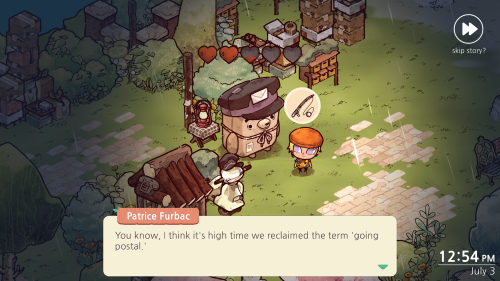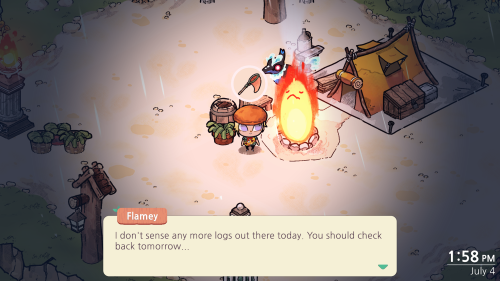So, I have a game in my head today, and it’s not actually one I played recently.
I blame this video, which we watched yesterday evening during dinner prep:
It reminded me that even though I didn’t “really” play this one – I just watched someone else do it and offered occasional commentary – it really is a pretty great representative of the video-game-as-art.
An RPG where you may never really meaningfully engage in combat of any kind, where your skills aren’t things like Strength or Dexterity or Intelligence but rather “Visual Calculus” and “Shivers” and “Inland Empire.” Where your skills are voices in your head that literally talk to you, pushing for one course of action or another, making suggestions, informing.
A tale of a disgraced cop who opens the adventure by apparently going on a bender so massive and so intense that he wipes out his very identity and must re-learn how the world works.
A densely-written exploration of a city and all the tangle of stories in it.
An experience that is by turns darkly funny, ominous, emotionally touching, and (at least once) a little awe-inducing, too.
A lot of the rhetoric around the game on its subreddit and such seem to suggest that people think it’s bleak, or depressing, but I’m not sure where they are getting that from. There’s an awful lot of hope in it, too, and stress on the importance of connections and connectedness.
I like the video creator’s suggestion that really, all of us who live in cities live in a different one. This is true, I think, though having been forcibly cut off from it for going-on-two-years thanks to the pandemic has somewhat dulled my sense of what the city is.
When I moved here, someone who would become a very close friend insisted on taking me around on a tour. “I want this to feel like your city.” I’ve always appreciated that; it is one of those memories I like to pull out and consider when I am craving something that feels rather cozy. And I wonder, sitting here, feeling isolated from it, what my experience of the city was, and what it will be again when I can go back out into it.
What I remember: I live in a city that is full of art.
That means art in the somber, stoic ways of the Royal Ontario Museum or the AGO, where I can (could) go to spend some pleasant hours taking things in, a kind of communion where instead of partaking of what someone tells you is the body of a god that died for you it is another human being, giving of themselves across time and space and identity and place. Across that tiny synapse of a gap between selves, vast enough to contain all the oceans and never be truly full.
That means art in the rough edges of surprise, the bit of graffiti where almost nobody looks, the painted doors and mailboxes, the mural around a corner, the mysterious signage on a lamp-post with a story in it. The same impulse, less stately but no less intense.
That means art in the kitchens of cozy neighborhood pubs with worn upholstery and that one little crack in the window that someday someone will get around to fixing, maybe. And tiny little cafes barely big enough for a table and grand modernist food vistas that charge hundreds of dollars for a little ballet of delicate, edible constructions. And, yes, even the mildly exasperating, how-is-it-possible-to-be-this-hipster-and-this-bourgeois-at-the-same-time places, the ones where sometimes I feel I ought to be angry with them but at the same time isn’t it just someone having a dream?
That means art on the stages of grand performance venues where actors and singers and dancers whose names are known to the faithful come to present tales and songs, and also art on the street corners and in the tiny, cramped interiors of local bars where performers of all sorts come to gather, and to do the things they must in order to live. (Because the president of Square is wrong; what yearns for expression will express itself.)
That means art in the hands and on the workbenches and on the carefully-arranged shelves of the tiny shops of local craftsmen and artisans, some who make glamorous things like high-end jewelry and some whose shelves are lined with soap or blends of tea or dainty little candies or…anything, really.
Yes, the city is also, in some ways, bleak and messy and poorly managed. Yes, affordability is a problem. Yes, it, and everywhere, struggles right now with treating its people well. But it is also full of interesting people, making and doing and being and sometimes telling their stories to one another. Humans do that.
It is oddly reassuring to me to think about it still happening, out there, somewhere, even if I cannot go out into it right now. Perhaps someday I will get to go exploring again. I like that idea. I wonder what I will find.
I wonder very much what kind of city the others around me live in. What their experiences are like. What frames them. What they see when they ride a city bus or wait on a subway platform or look out a window onto a wintry landscape. Does the woman on the bus opposite me live in a cutthroat city, where everyone is constantly striving to backstab their way into positions of power? Does the man in the coffee shop staring at his phone live in a tedious city, bland and enervating? Or perhaps it is alienating, cold, spiritless?
I wonder what kind of city I will live in when I go back out into it; when I eventually manage to overcome the constant sensation of too-brightness, too-loudness, too-muchness and the unease of so many, so close. I hope it is as fun to go exploring in.
And now I think I need to read Invisible Cities.

